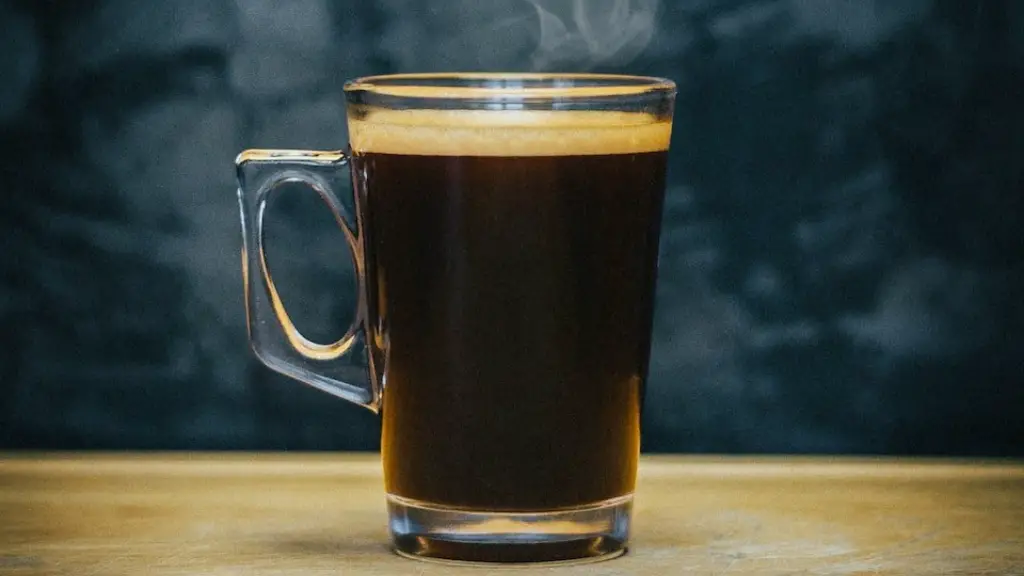Background Information
Whether or not toddlers can or should drink decaf coffee is a subject that has come under increasing debate in recent years. Decaf coffee is, essentially, regular coffee that has had the majority of its caffeine content removed. Although most toddlers don’t drink coffee, there is the occasional case where parents have given the child decaf coffee, usually as part of a treat. However, there are some associated risks and potential downfalls of giving toddlers decaf coffee.
Relevant Data
The American Academy of Pediatrics (AAP) advises against giving any caffeinated drinks to children under the age of 5. It is also noted that decalf coffee contains about two to twelve milligrams of caffeine per cup. This is lower than the average amount found in regular coffee, which is around seventy-five to one hundred milligrams per cup. In comparison, chocolate has around nine milligrams of caffeine per one-ounce serving. Therefore, this means that decaf coffee still has higher levels of caffeine than chocolate.
Perspectives from Experts
Experts suggest that even a small amount of caffeine can be detrimental for toddlers. For some toddlers, even two milligrams of caffeine consumption can lead to restlessness, rapid breathing, irritability, and insomnia. In addition, due to the fact that young children have smaller bodies, less developed livers, and are overall more sensitive, they are unlikely to be able to process the caffeine as efficiently as an adult. Therefore, it is important to be aware of the potential risks when giving any type of caffeinated drink to a child.
Insights and Analysis
Although decaf coffee has had the majority of its caffeine removed, it is still important to understand the potential effects of caffeine and its effects on toddlers. The AAP recommends that children under the age of five should not consume any type of caffeinated drinks and, as such, it is best to avoid giving decaf coffee to toddlers. While the occasional cup of decaf coffee is unlikely to cause any harm to the toddler, it is important to understand that young children are more sensitive and will therefore be more prone to the effects of caffeine. Therefore, it is important to bear in mind that caffeine should not become a regular part of the diet for a toddler.
Health Risks
In addition to the risks associated with the effects of caffeine on toddlers, there are also potential health risks associated with decaf coffee. It is important to note that decaf coffee contains other compounds and chemicals that are, in some cases, potentially harmful to a toddler’s health. The compounds include components of the chemical solvents used to remove the caffeine, as well as compounds derived from the roasting and brewing process. Consumption of these compounds could lead to potential health problems in toddlers.
Options for Toddlers
When deciding what beverage to give a toddler, it is important to understand that there are other options available. Water is the healthiest option and can help to hydrate the toddler. There are also non-caffeinated beverages that are specifically for toddlers, such as infant juice. This is specifically formulated to provide the various vitamins and minerals that a toddler needs for their development.
Caffeine Alternatives
When it comes to caffeine alternatives, there are a number of caffeine-free beverages available such as herbal teas or fruit juices. There are also various decaffeinated products available, such as decaffeinated tea or decaffeinated cocoa. It is important to note that these are not the same as regular tea or cocoa, and may still have some traces of caffeine in them. Therefore, it is best to consult a healthcare professional before offering these drinks to a toddler.
Decaf Coffee and Weight Gain
It is well known that caffeine can have an effect on weight gain. However, the effects of decaf coffee on weight gain are not as well known. Studies suggest that there may be a small effect on weight gain from the consumption of decaf coffee, although the effects are likely to be marginal. Therefore, it is important to note that consumption of decaf coffee may contribute to weight gain in toddlers if consumed in excess.
Caffeine Addiction
Another factor to consider is the potential for caffeine addiction. It is well known that caffeine can be addictive and, while the amount of caffeine in decaf coffee is much lower than in regular coffee, it is still important to be aware of the potential effects. Studies have found that regular consumption of caffeine can lead to increased cravings and a need for higher doses of caffeine. Therefore, it is important to be aware of the potential for caffeine addiction, even with decaf coffee.
Social Impact of Decaf Coffee
Finally, it is important to consider the social implications of giving a toddler decaf coffee. It can be seen as a ‘treat’ or a ‘treaty’, but there should be an understanding of the potential health risks and the importance of moderation. Giving toddlers decaf coffee should be done carefully and in moderation, as there are potential risks associated with its consumption.


